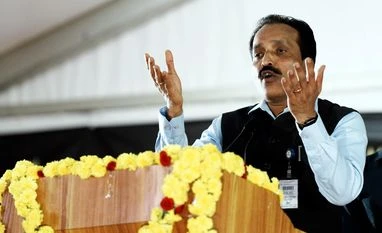'Isro to develop ECLSS for Gaganyaan mission after failing to procure it'
"We thought that this knowledge would come from other nations, but unfortunately after so much discussion, nobody is willing to give it to us," Somanath said
)
ISRO Chairman S Somanath (Photo: PTI)
Listen to This Article
ISRO chairman S Somanath on Wednesday said the space agency has decided to indigenously develop the environmental control and life support system (ECLSS) for the upcoming human space flight mission Gaganyaan, after it failed to get it from other countries.
The Gaganyaan project envisages a demonstration of Indian Space Research Organisation's human spaceflight capability by launching a human crew to an orbit of 400 km and bringing them safely back to earth by landing in Indian sea waters. It is expected to be launched in 2025. "We have no experience in developing an environmental control life support system. We were only designing rockets and satellites. We thought that this knowledge would come from other nations, but unfortunately after so much discussion, nobody is willing to give it to us," Somanath said.
He was addressing the 5th edition of Manohar Parrikar Vidnyan Mahotsav 2023 at Dona Paula, an event organised by Goa's Science, Environment and Technology Department. Somanath said that ISRO has now decided to indigenously develop the ECLSS.
"We are going to develop it in India using the knowledge we have and using the industries that we have," he said. Speaking about the challenges before the Gaganyaan programme, he said India has been into knowledge-building design capability development over the last so many years and the pinnacle of this is going to be the Indian human space flight programme. "When we send humans to space through our Gaganyan programme, I think the amount of skill and confidence that we need to have has to be higher than what we currently have," he said. Somanath said that the confidence-building process is happening all across ISRO today with the support of national laboratories. The first part of the Gaganyaan programme is the rocket. "The rockets are always bound to fail; whenever it is ready for launch our tension and heartbeats go up because even if the rocket is built very safely having all the processes followed, something can still go wrong," he said.
"And if it goes wrong, then there is nobody who is able to correct it or adjust it. Thousands of elements should work without any flaw to make a launch happen," he said. Somanath said that there is always a risk of failure.
"When you have a failure possibility, then you must have protection against it in human space flight. This is a core of human space flight - that we should not put the risk of having the astronaut lost due to the failure in the rocket," he said. "So it calls for intelligence in the rocket. This is what we are working on today," he said. The people in the new generation understand what intelligence is and how to create intelligence in machinery by censors, data processing, artificial intelligence to create signals of various natures and then come to a conclusion that the rocket is going to fly safely or it is going to fail, he added. Somanath said the decision in case of failure has to be taken in less than a fraction of a second.
"Then you have to tell the rocket that you are going to fail now and you better abort even before failure happens. This is a challenge of working on intelligence in the rocket and we are working on such technologies today, looking at the data which is available in measurements and then making a synthesis of it," he said. Somanath said that ISRO was developing many new technologies to handle human space flight.
(Only the headline and picture of this report may have been reworked by the Business Standard staff; the rest of the content is auto-generated from a syndicated feed.)
More From This Section
Don't miss the most important news and views of the day. Get them on our Telegram channel
First Published: Dec 13 2023 | 4:27 PM IST
